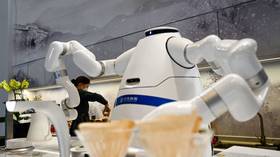Warning over risk to robot relationships
The growing reliance of humans on the support of robots comes with a concern that some staff are becoming emotionally closer to their robots than they are to their human colleagues.
Researchers at the University of Michigan and Sungkyunkwan University (South Korea) found with the growing use of robots, has led to detrimental relationships as workers become more attached to the robot than their colleagues.
The study found that human-robot teams can fracture into subgroups functioning more like two competing teams rather than one overall coherent team.
“Much attention has been directed at the positive outcomes of bonding, such as higher work engagement and enjoyment, but few studies have looked at the negative repercussions for team relationships and performance,” the study stated.
“This topic remains relatively unexplored despite the potential importance of subgroups in human-robot teams,” said study co-author Lionel Robert, associate professor at the U-M School of Information.
Robert and lead author Sangseok You, assistant professor at Sungkyunkwan University, conducted two studies. One was a quantitative randomised experimental lab study and the other a qualitative study with data collected from workers and managers in the field who work with robots daily.
In the lab study, 88 people were assigned to 44 teams, each consisting of two humans and two robots, that would move bottles from different points in a competition. The participants answered questions about their performance and connection to their human and robot partners. Among the results: When humans connected more with the robot, a subgroup within the team pairings emerged, which negatively altered the teamwork quality and performance.
The second study sought to obtain recommendations to mitigate the negative effects of the subgroups while enhancing the work environment. The 112 respondents in this sample—who came from various industries, manufacturing and sales, hospitals, financial advising and others—managed others who worked directly with robots. They answered questions about ensuring good working relationships between human co-workers in human-robot teams.
The findings showed that training, improving communication among humans and providing leadership mitigated the effects of subgroups that undermined performance. For example, the respondents had more social interactions, such as attending picnics and sports events, and taking coordinated breaks with human co-workers.
“When employers have a greater connection with each other rather than robots, the teamwork quality is high,” You said.
Follow us on twitter: @risksEmerging
Humans getting too emotionally attached to robot coworkers – study

Situations where a human employee develops a strong emotional bond to their robot colleague could see the company’s overall “teamwork quality and performance” decline, a group of US and Korean researchers have warned.
A study penned by scientists from the University of Michigan and South Korea’s Sungkyunkwan University was published on February 10. It found that in cases where a worker is more attached to a robot, a kind of ‘us-versus-them’ mentality often emerges, with the human-machine pairing competing with the rest of the team instead of contributing positively to “team relationships and performance.”
The introduction of robots into the workplace has so far been predominantly seen as a positive thing, while possible negative repercussions have largely been overlooked, researchers point out.
Lionel Robert, associate professor at the University of Michigan School of Information, and Sangseok You, assistant professor of management information systems at Sungkyunkwan University, carried out a series of experiments to find out how excessive bonding between humans and robots affects a team’s overall performance.
One quantitative randomized lab study involving 88 workers saw them split into 44 teams, each made up of two humans and two robots. The teams were tasked with moving bottles from different points in a competition-like environment. After the experiment was over, the participants were asked how they assessed their performance and connection to their human and robot partners. It transpired that, when humans developed more of a bond with robots, the tiny teams of four (two humans plus two machines) were likely to further divide into subgroups, which understandably undermined the overall team “quality and performance.”
The researchers also suggested a number of remedies which could help prevent such an undesirable process from developing within a company. The recommendations were based on the experiences of 112 respondents representing various industries where humans work alongside robots.
The bottom line is that special efforts should be made to improve communication among humans, or else they may end up getting attached to machines instead.
If these findings are anything to go by, such activities as joint picnics and sports events for employees are good ways of enhancing team spirit.

No comments:
Post a Comment